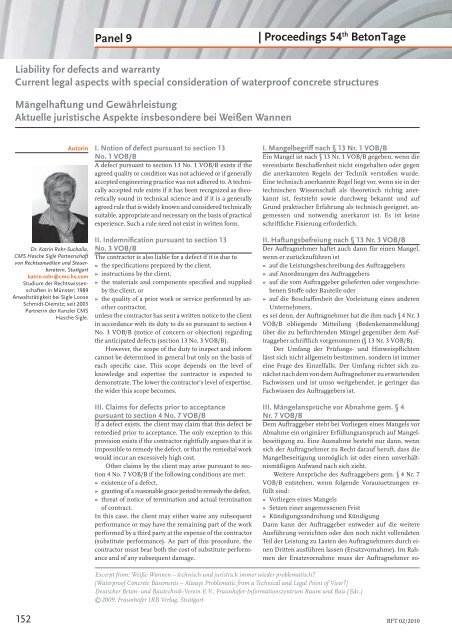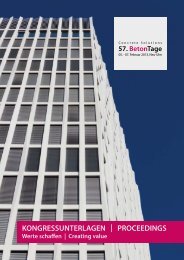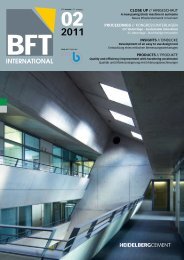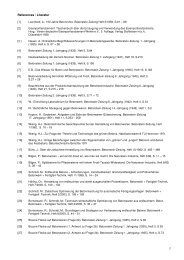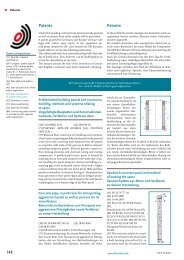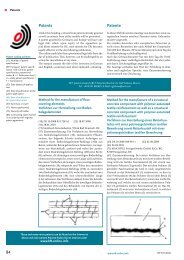Concrete Plant + Precast Technology Betonwerk ... - BFT International
Concrete Plant + Precast Technology Betonwerk ... - BFT International
Concrete Plant + Precast Technology Betonwerk ... - BFT International
Erfolgreiche ePaper selbst erstellen
Machen Sie aus Ihren PDF Publikationen ein blätterbares Flipbook mit unserer einzigartigen Google optimierten e-Paper Software.
152<br />
Panel 9<br />
| Proceedings 54 th BetonTage<br />
Liability for defects and warranty<br />
Current legal aspects with special consideration of waterproof concrete structures<br />
Mängelhaftung und Gewährleistung<br />
Aktuelle juristische Aspekte insbesondere bei Weißen Wannen<br />
Autorin<br />
Dr. Katrin Rohr-Suchalla,<br />
CMS Hasche Sigle Partnerschaft<br />
von Rechtsanwälten und Steuerberatern,<br />
Stuttgart<br />
katrin.rohr@cms-hs.com<br />
Studium der Rechtswissenschaften<br />
in Münster; 1989<br />
Anwaltstätigkeit bei Sigle Loose<br />
Schmidt-Diemitz; seit 2003<br />
Partnerin der Kanzlei CMS<br />
Hasche Sigle.<br />
I. Notion of defect pursuant to section 13<br />
No. 1 VOB/B<br />
A defect pursuant to section 13 No. 1 VOB/B exists if the<br />
agreed quality or condition was not achieved or if generally<br />
accepted engineering practice was not adhered to. A technically<br />
accepted rule exists if it has been recognized as theoretically<br />
sound in technical science and if it is a generally<br />
agreed rule that is widely known and considered technically<br />
suitable, appropriate and necessary on the basis of practical<br />
experience. Such a rule need not exist in written form.<br />
II. Indemnifi cation pursuant to section 13<br />
No. 3 VOB/B<br />
The contractor is also liable for a defect if it is due to<br />
» the specifi cations prepared by the client,<br />
» instructions by the client,<br />
» the materials and components specifi ed and supplied<br />
by the client, or<br />
» the quality of a prior work or service performed by another<br />
contractor,<br />
unless the contractor has sent a written notice to the client<br />
in accordance with its duty to do so pursuant to section 4<br />
No. 3 VOB/B (notice of concern or objection) regarding<br />
the anticipated defects (section 13 No. 3 VOB/B).<br />
However, the scope of the duty to inspect and inform<br />
cannot be determined in general but only on the basis of<br />
each specifi c case. This scope depends on the level of<br />
knowledge and expertise the contractor is expected to<br />
demonstrate. The lower the contractor’s level of expertise,<br />
the wider this scope becomes.<br />
III. Claims for defects prior to acceptance<br />
pursuant to section 4 No. 7 VOB/B<br />
If a defect exists, the client may claim that this defect be<br />
remedied prior to acceptance. The only exception to this<br />
provision exists if the contractor rightfully argues that it is<br />
impossible to remedy the defect, or that the remedial work<br />
would incur an excessively high cost.<br />
Other claims by the client may arise pursuant to section<br />
4 No. 7 VOB/B if the following conditions are met:<br />
» existence of a defect,<br />
» granting of a reasonable grace period to remedy the defect,<br />
» threat of notice of termination and actual termination<br />
of contract.<br />
In this case, the client may either waive any subsequent<br />
performance or may have the remaining part of the work<br />
performed by a third party at the expense of the contractor<br />
(substitute performance). As part of this procedure, the<br />
contractor must bear both the cost of substitute performance<br />
and of any subsequent damage.<br />
I. Mangelbegriff nach § 13 Nr. 1 VOB/B<br />
Ein Mangel ist nach § 13 Nr. 1 VOB/B gegeben, wenn die<br />
vereinbarte Beschaff enheit nicht eingehalten oder gegen<br />
die anerkannten Regeln der Technik verstoßen wurde.<br />
Eine technisch anerkannte Regel liegt vor, wenn sie in der<br />
technischen Wissenschaft als theoretisch richtig anerkannt<br />
ist, feststeht sowie durchweg bekannt und auf<br />
Grund praktischer Erfahrung als technisch geeignet, angemessen<br />
und notwendig anerkannt ist. Es ist keine<br />
schriftliche Fixierung erforderlich.<br />
II. Haftungsbefreiung nach § 13 Nr. 3 VOB/B<br />
Der Auftragnehmer haftet auch dann für einen Mangel,<br />
wenn er zurückzuführen ist<br />
» auf die Leistungsbeschreibung des Auftraggebers<br />
» auf Anordnungen des Auftraggebers<br />
» auf die vom Auftraggeber gelieferten oder vorgeschriebenen<br />
Stoff e oder Bauteile oder<br />
» auf die Beschaff enheit der Vorleistung eines anderen<br />
Unternehmers,<br />
es sei denn, der Auftragnehmer hat die ihm nach § 4 Nr. 3<br />
VOB/B obliegende Mitteilung (Bedenkenanmeldung)<br />
über die zu befürchtenden Mängel gegenüber dem Auftraggeber<br />
schriftlich vorgenommen (§ 13 Nr. 3 VOB/B).<br />
Der Umfang der Prüfungs- und Hinweispfl ichten<br />
lässt sich nicht allgemein bestimmen, sondern ist immer<br />
eine Frage des Einzelfalls. Der Umfang richtet sich zunächst<br />
nach dem von dem Auftragnehmer zu erwartenden<br />
Fachwissen und ist umso weitgehender, je geringer das<br />
Fachwissen des Auftraggebers ist.<br />
III. Mängelansprüche vor Abnahme gem. § 4<br />
Nr. 7 VOB/B<br />
Dem Auftraggeber steht bei Vorliegen eines Mangels vor<br />
Abnahme ein originärer Erfüllungsanspruch auf Mangelbeseitigung<br />
zu. Eine Ausnahme besteht nur dann, wenn<br />
sich der Auftragnehmer zu Recht darauf beruft, dass die<br />
Mangelbeseitigung unmöglich ist oder einen unverhältnismäßigen<br />
Aufwand nach sich zieht.<br />
Weitere Ansprüche des Auftraggebers gem. § 4 Nr. 7<br />
VOB/B entstehen, wenn folgende Voraussetzungen erfüllt<br />
sind:<br />
» Vorliegen eines Mangels<br />
» Setzen einer angemessenen Frist<br />
» Kündigungsandrohung und Kündigung<br />
Dann kann der Auftraggeber entweder auf die weitere<br />
Ausführung verzichten oder den noch nicht vollendeten<br />
Teil der Leistung zu Lasten des Auftragnehmers durch einen<br />
Dritten ausführen lassen (Ersatzvornahme). Im Rahmen<br />
der Ersatzvornahme muss der Auftragnehmer so-<br />
Excerpt from: Weiße Wannen – technisch und juristisch immer wieder problematisch?<br />
[Waterproof <strong>Concrete</strong> Basements – Always Problematic from a Technical and Legal Point of View?]<br />
Deutscher Beton- und Bautechnik-Verein E.V.; Fraunhofer-Informationszentrum Raum und Bau (Eds.)<br />
©2009, Fraunhofer IRB Verlag, Stuttgart<br />
<strong>BFT</strong> 02/2010


